How to create an effective Facebook advertising campaign in 2023
Learn what changes affect marketers in the Facebook ads platform, how to set up a winning campaign, and tips for testing your ads.
Are Facebook ads still working in 2023? That’s the question everyone keeps asking and I’m excited to say – yes, absolutely!
Facebook (Meta) has been a difficult beast the last couple of years since Apple iOS 14 changed everything. But as Facebook’s modeling and AI have caught up with all the changes, I’m now seeing better ad performance than I’ve seen in years.
While I do think it’s smart to diversify your advertising channels, Facebook is still the top social network at 2.9 billion monthly active users and they just passed the 2-billion mark for daily active users.
In this article, you will learn what changes affect marketers in the ads platform, how to set up a winning Facebook ads campaign, and tips for testing your ads.
Changes to Facebook ads in 2023
Facebook’s Pixel and modeled tracking has improved greatly in the past year but still isn’t perfect. If you have the Conversion API set up, you will get better results. While this isn’t a new change, it’s something that everyone should work to implement.
Advantage+ shopping campaigns are doing well for most ecommerce businesses that have access to this new tool which is still rolling out. This type of campaign uses machine learning to serve ads to your highest-value customers and uses broad targeting.
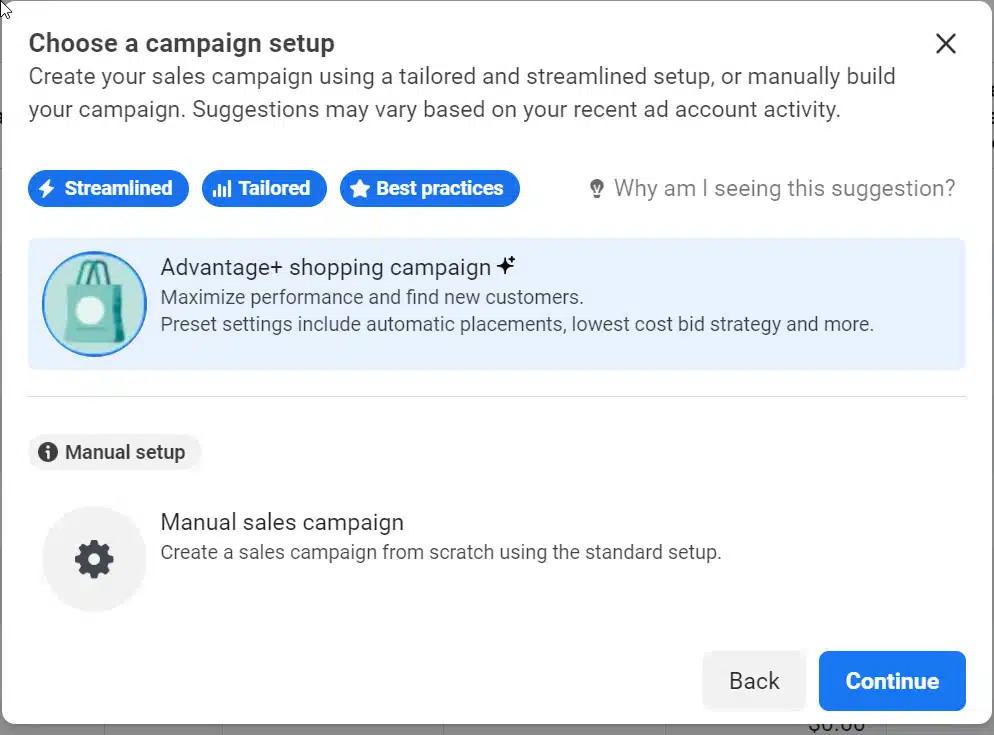
Facebook has also rolled out several Advantage+ options including Advantage+ placements which used to be called “All placements.” This placement type includes placements off of Facebook and Instagram in their Audience Network partnerships. While Advantage+ can work for some businesses, I typically see better results in “Feed only” placement.
Advantage+ options typically use Facebook’s machine learning to drive costs down but are not always good during the testing phase because you won’t know exactly what is working.
Broad targeting is working much better than keywords and Lookalike audiences in many cases.
The good news is that we don’t have to do as much audience testing and can focus more on creative testing. As Facebook’s AI improves, it will be even easier for advertisers to get better results.
Facebook has also brought back some of the tools they had taken away, like the longer 28-day attribution window and attribution comparison. Better visibility into attribution allows a better connection to the true ROI of our campaigns.
Key elements of an effective Facebook ad campaign
The four key elements for Facebook campaigns still remain:
- Select the right goal.
- Make sure your tracking is in place with the Pixel and the Conversion API.
- Design meaningful split tests.
- Read the reports and scale what is working.
Let’s dive deeper into these steps and touch on what’s changed in 2023.
Selecting the right goal for your Facebook campaign
Many people don’t choose the right optimization for their campaign and it can waste a lot of money. Typically, leads and sales are the best choices for most companies to get better results.
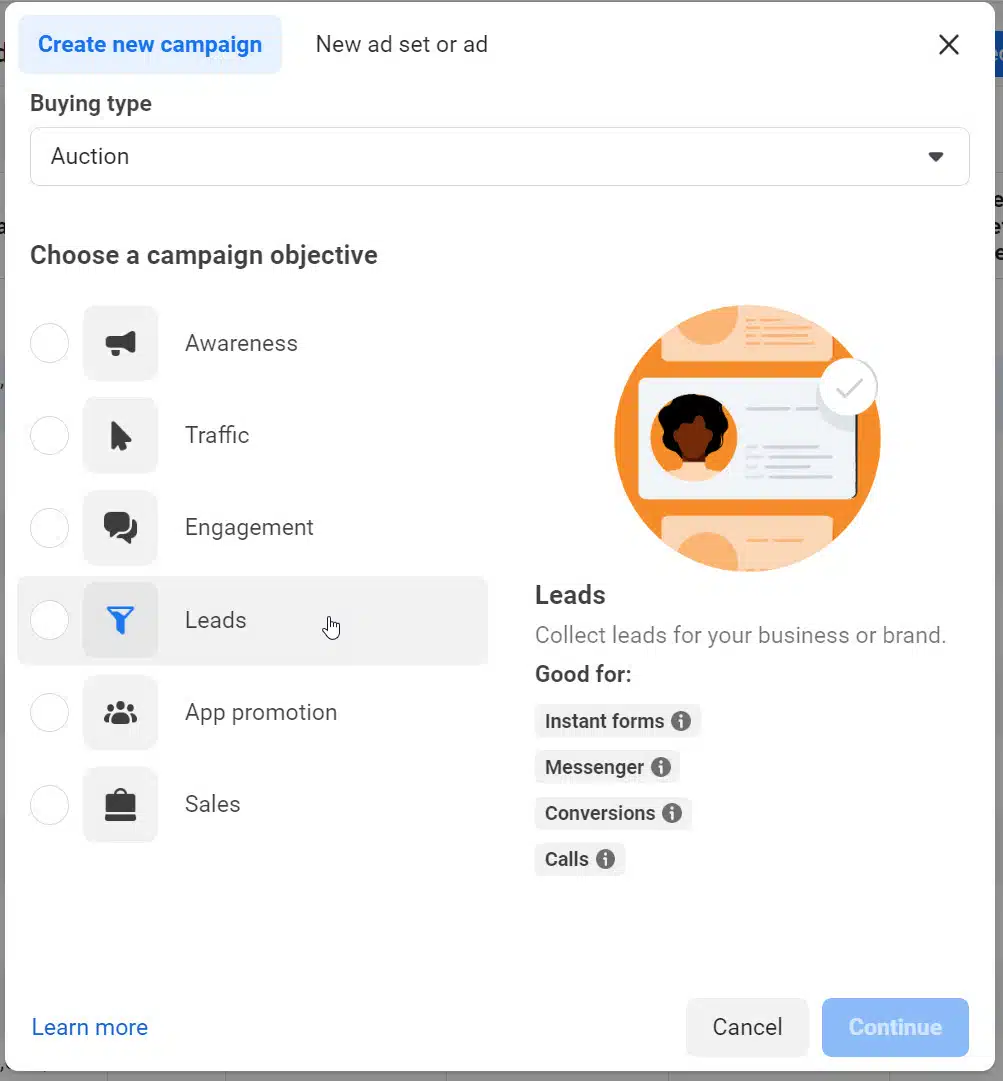
Lead generation works well on Facebook as compared to straight selling because we don’t get the “buying signals” that we do from Google searches.
Make sure you know if you are using an Instant Form (popup that happens on Facebook) or sending people to your website where you have the Base pixel code and Lead pixel code properly installed.
Instant forms have been a solid ad performer so far in 2023 but one of the challenges is always lead quality. Using higher intent forms and requiring more information can help give better, but more expensive leads.
For sales campaigns you need to have the Pixel and, if possible, Conversion API implemented. For most businesses, the retargeting audiences continue to be the best performers when optimizing for purchases.
Tracking on Facebook
The more data you track through your funnel, the better results you will get. Many shopping carts easily integrate with the Pixel and Conversion API.
Facebook has integration tools in the Events Manager that can help install the Conversion API easily if you use WordPress or Google Tag Manager.
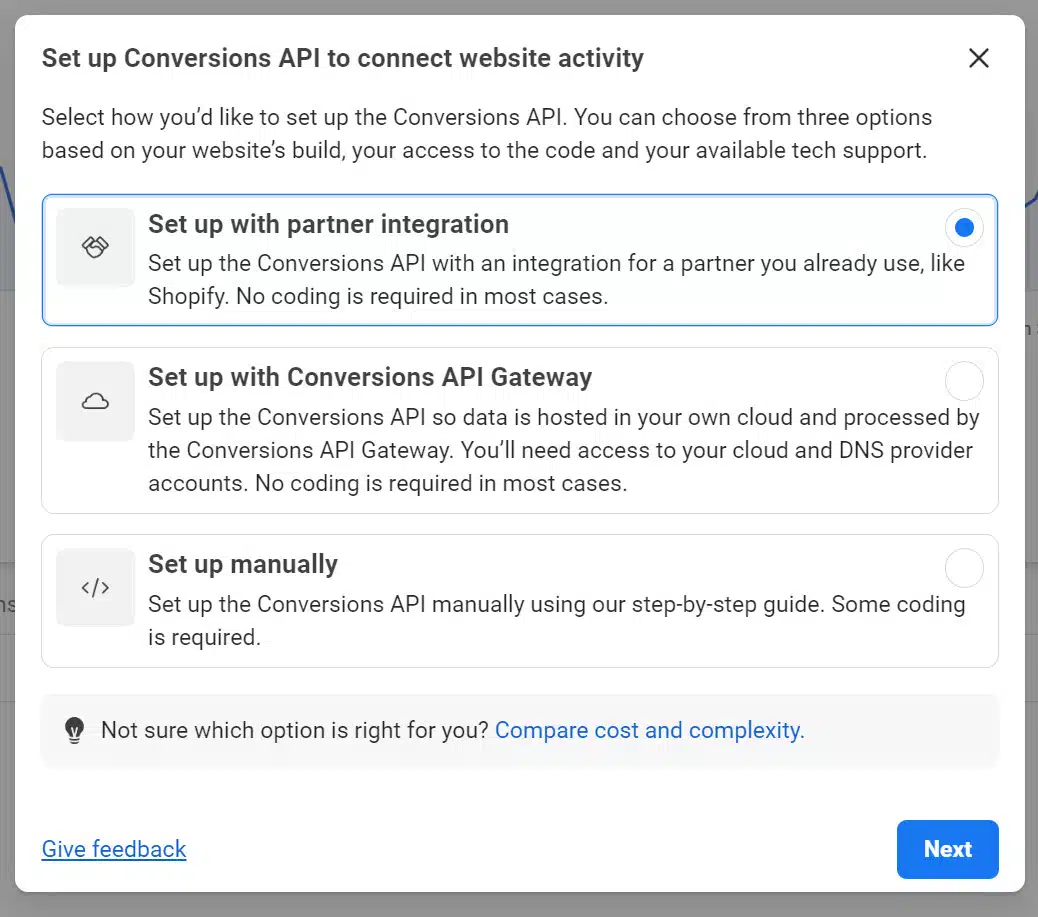
When you track properly, you can make better decisions about what is working. You can see things like “Adds to cart” and your “Purchase ROAS.”
You’ll be able to tell if Facebook’s optimization is working or if you need to split your campaigns up to focus your budget on the ads or audiences that are most profitable.

How to properly test your Facebook ads
Testing has changed on Facebook with the improvement to broad targeting. I suggest still testing Lookalike Audiences and some keywords or job titles if relevant to your avatar. But be smart about your test plan.
Here’s an example of a very basic 10-day ads test plan.
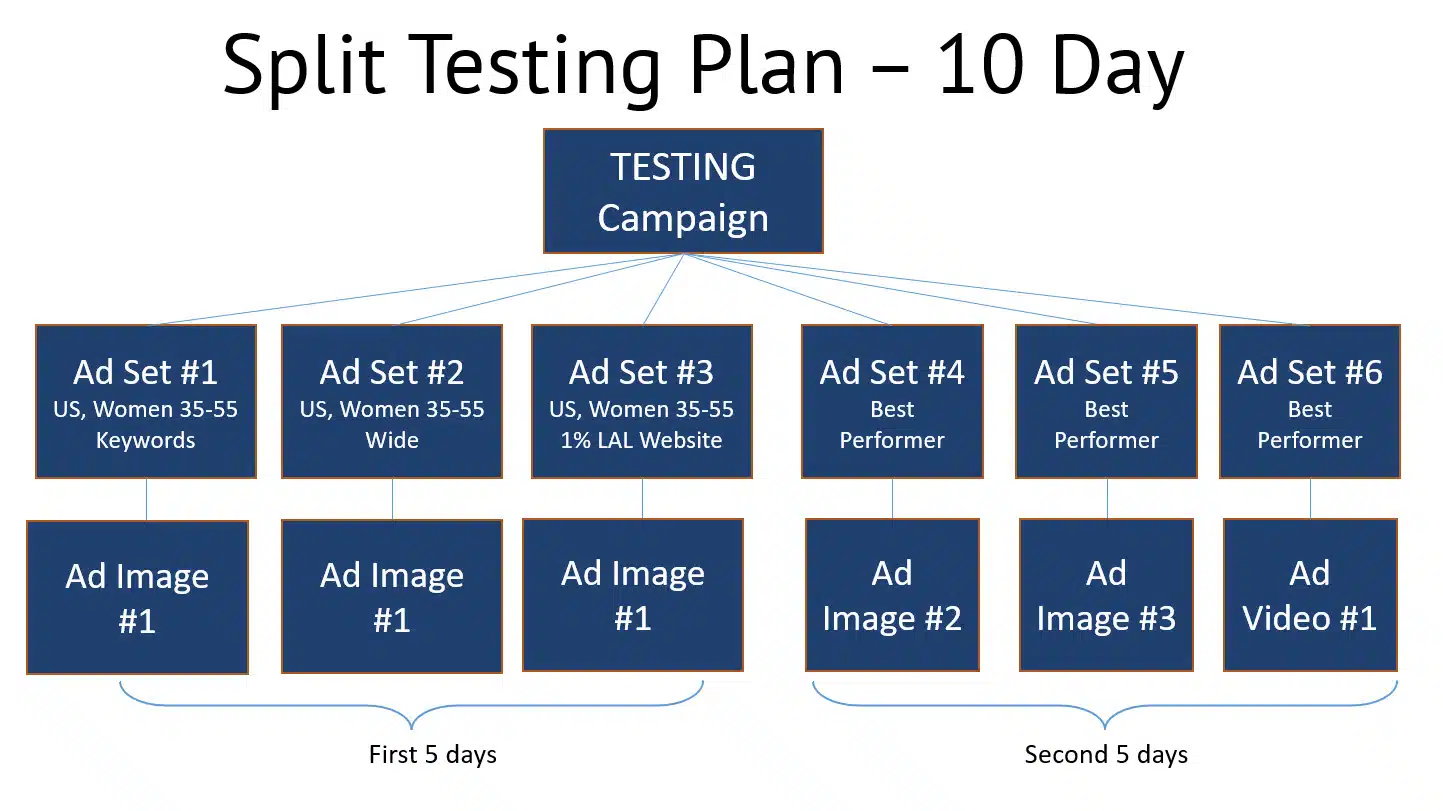
Test the audiences first with the same budget, ad and creative under each ad set.
After 5 days, you’ll have more information about which audience performed best. Then use the best-performing audience to individually test new creative.
There are a lot of nuances to this (such as the significance of results and overall budget), but this is a good place to start.
Creative testing has always been important but now that we don’t need as many audiences to test, we can dive a little bit deeper into different creatives.
What I’ve seen working on Facebook in 2023 is big bold text.

The 20% text rule is long gone and now anything goes for attracting attention and stopping the scroll.
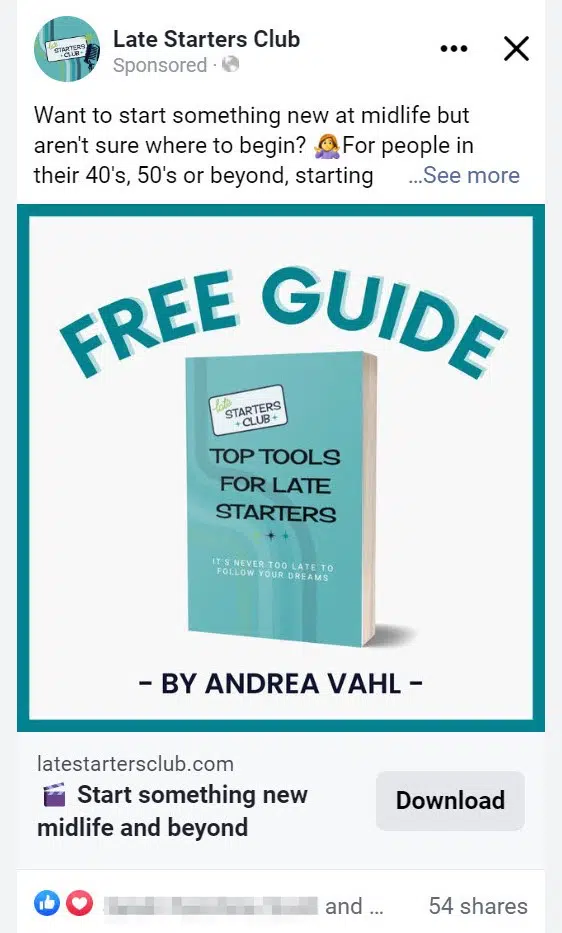
Anything that looks different can also attract attention. User reviews and carousel ads are good ways to retarget potential customers.
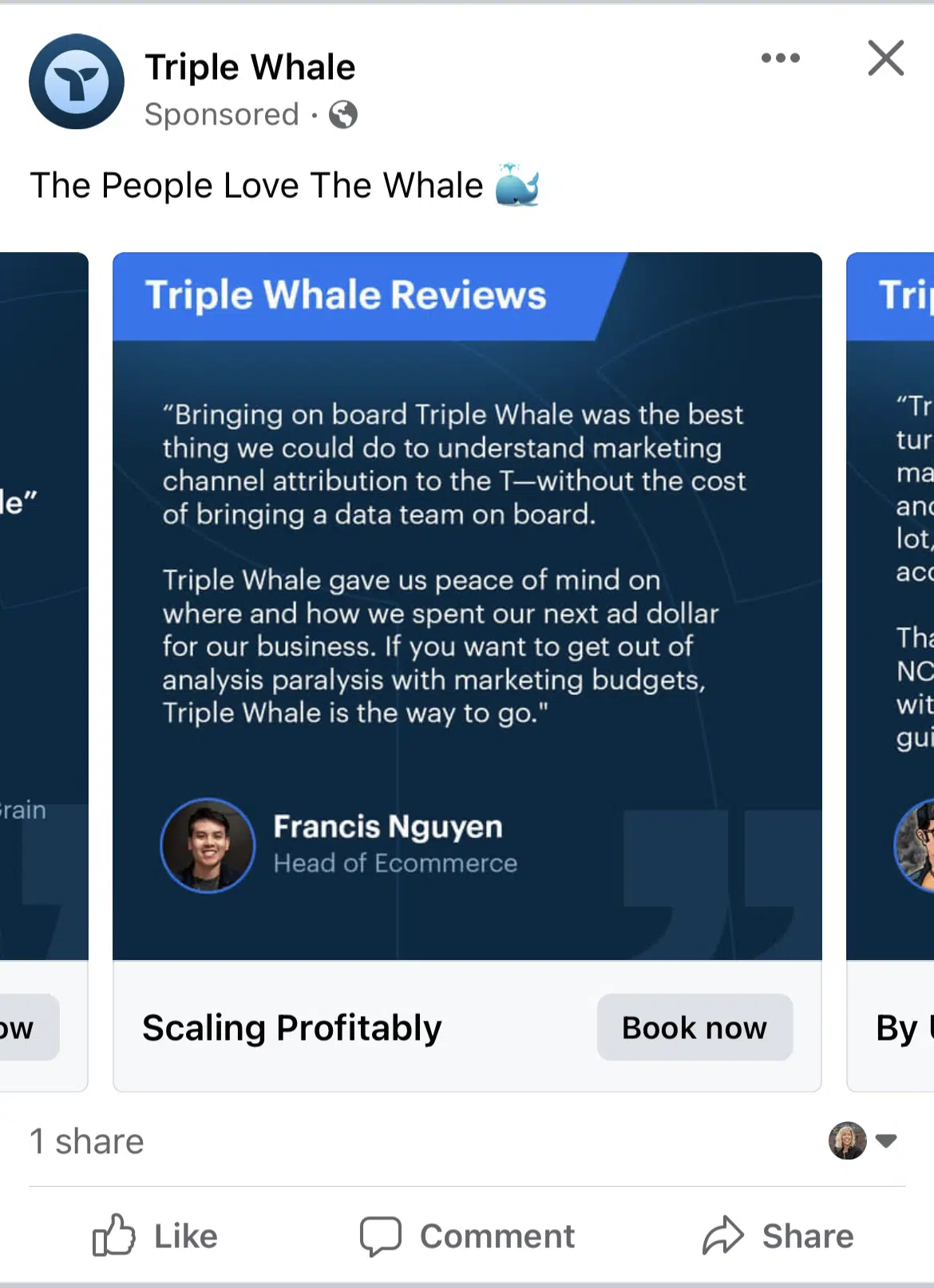
Other creative options that are working and can be tested are casual videos that look native to Facebook. Video ads can work well to “presell” your offer but definitely test what works compared to image-only ads.
When testing creative, make sure to use images that are very different from each other to get the widest range. Usually varying something small like the subheadline or color will not give you significant results.
Reading ad reports and scaling
In general, I’ve still been scaling up my ad sets with ad set budget optimization (ABO) scaling.
But campaign budget optimization (CBO) scaling can benefit larger budgets. To use CBO scaling, add the winning ads and audiences into one campaign and increase your budget by 20-30% every few days. Your strategy will depend on the promotion time, overall budget and type of business.
The good news is that the Breakdown reports have come back to Facebook so that we can see where we are getting the best results based on age, gender, country, and placements.

Testing is and always has been the best way to get better results on Facebook. As you iterate you will find your best performers.
Don’t forget to test different lead magnets, different offers, and different landing pages as well. Small improvements at the top of the funnel can lead to massive results at the bottom of the funnel.
Facebook is still here to stay in 2023 and I’m glad to see improvements in overall results. Cheers to better ads.
Contributing authors are invited to create content for Search Engine Land and are chosen for their expertise and contribution to the search community. Our contributors work under the oversight of the editorial staff and contributions are checked for quality and relevance to our readers. The opinions they express are their own.
Related stories